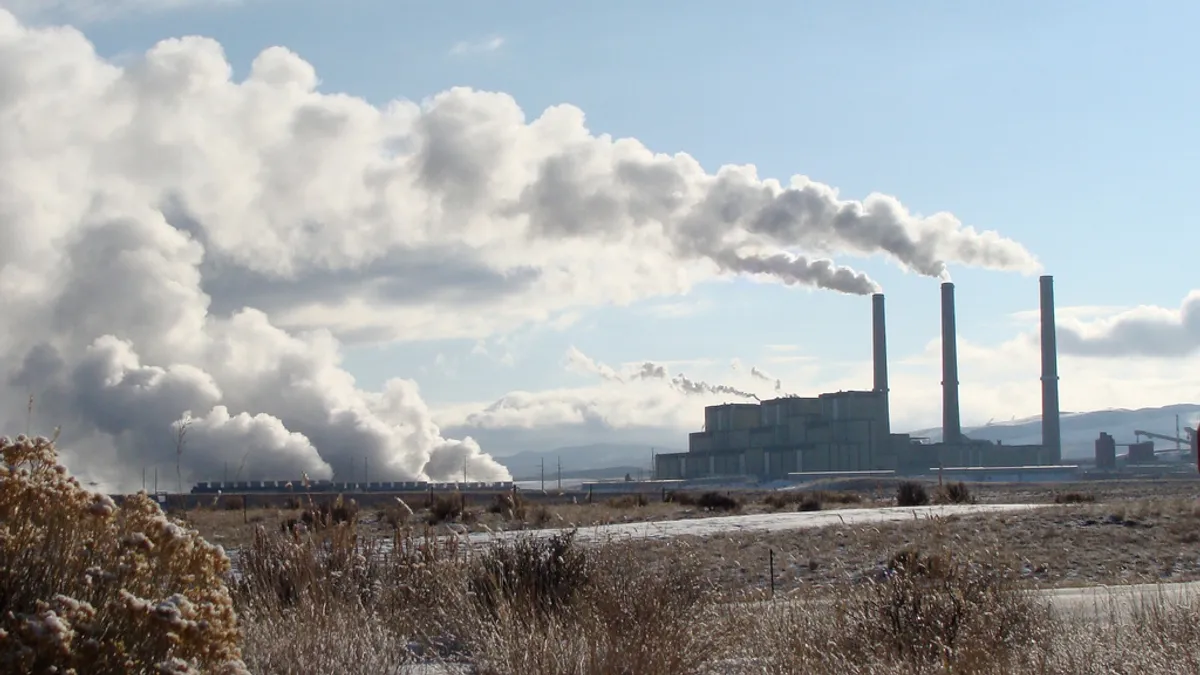Dive Brief:
- Delta-Montrose Electric Association (DMEA) will exit the service of Tri-State Generation & Transmission Association May 2020, the company announced Tuesday. Tri-State filed the same day to become federally regulated, which would allow it to avoid rate oversight from Colorado regulators.
- DMEA and Tri-State filed their settlement agreement July 19 with the Colorado Public Utilities Commission (PUC), which will dismiss a complaint that DMEA filed last year. The settlement would also nullify the temporary restraining order DMEA filed against Tri-State, intended to keep Tri-State from avoiding state regulation.
- The agreement marks the end of a high-profile dispute between Tri-State and DMEA over the G&T's coal-heavy power mix, and sets an exit charge the two companies agreed is fair and reasonable. DMEA will continue to rely on Tri-State for transmission service.
Dive Insight:
The announcement yesterday avoids a protracted fight over DMEA's exit fee, which has already been a point of contention between the two companies, but so far the two sides are mum on what the actual cost will be. Financial figures have been redacted from the public version of the settlement agreement filed with Colorado regulators, but those numbers will be made public once DMEA actually withdraws.
The cooperative is "pleased with our settlement and would not have agreed to a exit charge that we did not believe was fair and equitable for our members," a spokesperson told Utility Dive in an email.
DMEA was "willing to release the exit charge," but respects "Tri-State's request to keep these figures confidential until the actual time of our withdrawal."
Following its exit from Tri-State, DMEA will partner with Guzman Energy, a Colorado-based regional power supplier delivering clean energy.
Tri-State officials released a brief statement saying both companies' boards of directors had approved the settlement.
"No additional details of the agreement will be released," Tri-State said.
Kit Carson Electric Cooperative in New Mexico bought out of its contract with Tri-State three years ago after reaching an agreement to pay $37 million. DMEA sought a similar exit, but said Tri-State "calculated a dramatically high exit charge and has declined to meaningfully vary from that calculation in the intervening years," according to DMEA's original complaint.
Kit Carson serves roughly 30,000 customers, and in 2016 said it expected they would save $50 million over the term of a 10-year agreement it also inked with Guzman. La Plata Electric Association is also considering an exit and has requested the generation provider determine the buy-out cost.
Tri-State has been under growing pressure since last year, when a Rocky Mountain Institute study that concluded the utility's 1 million consumers could save more than $600 million through 2030 by retiring some coal plants and adopting renewables. The generator also recently rejected an offer from Guzman to help it replace its coal generation.
Instead, Tri-State last week announced it would develop a Responsible Energy Plan to reduce the carbon emissions of its generation fleet while also cutting costs and ensuring reliability. The utility says it has already been reducing its coal use by accessing market power when the economics make sense. And, the generator is retiring Unit 1 of its Craig Station by the end of 2025 as well as its 100 MW Nucla station in early 2020.
DMEA officials say they are "moving toward putting aside differences with Tri-State, which have extended back for a number of years."
"DMEA recognizes the importance of its continued partnership with Tri-State in various areas, and we know we will continue to rely upon Tri-State for safe and reliable transmission service," DMEA CEO Jasen Bronec said in a statement.
Seeking federal regulation
Tri-State operates in four states and currently does not face federal oversight — but said Tuesday it has made tariff application filings with FERC and expects them to be accepted in 60 days.
If the filing is accepted, Tri-State will be fully rate regulated by the federal commission, according to the company.
"Tri-State is positioning our cooperative for the future," Tri-State CEO Duane Highley said in a statement. "Rate regulation certainty is necessary as we accelerate our pursuit of renewable energy and member flexibility, decrease emissions and strive to lower members’ wholesale rates."
Colorado regulators recently expressed concern that Tri-State has not been completely up front about the possibility it would seek federal regulation. PUC Commissioner Frances Koncilja said she has "some serious questions about whether or not Tri-State has been candid with us."
Tri-State did not respond to questions about Koncilja's comment.















